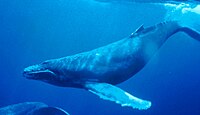
Photo from wikipedia
Microplastics receive significant societal and scientific attention due to increasing concerns about their impact on the environment and human health. Marine mammals are considered indicators for marine ecosystem health and… Click to show full abstract
Microplastics receive significant societal and scientific attention due to increasing concerns about their impact on the environment and human health. Marine mammals are considered indicators for marine ecosystem health and many species are of conservation concern due to a multitude of anthropogenic stressors. Marine mammals may be vulnerable to microplastic exposure from the environment, via direct ingestion from sea water, and indirect uptake from their prey. Here we present the first systematic review of literature on microplastics and marine mammals, composing of 30 studies in total. The majority of studies examined the gastrointestinal tracts of beached, bycaught or hunted cetaceans and pinnipeds, and found that microplastics were present in all but one study, and the abundance varied between 0 and 88 particles per animal. Additionally, microplastics in pinniped scats (faeces) were detected in eight out of ten studies, with incidences ranging from 0% of animals to 100%. Our review highlights considerable methodological and reporting deficiencies and differences among papers, making comparisons and extrapolation across studies difficult. We suggest best practices to avoid these issues in future studies. In addition to empirical studies that quantified microplastics in animals and scat, ten studies out of 30 (all focussing on cetaceans) tried to estimate the risk of exposure using two main approaches; i) overlaying microplastic in the environment (water or prey) with cetacean habitat or ii) proposing biological or chemical biomarkers of exposure. We discuss advice and best practices on research into the exposure and impact of microplastics in marine mammals. This work on marine ecosystem health indicator species will provide valuable and comparable information in the future.
Journal Title: Environmental pollution
Year Published: 2020
Link to full text (if available)
Share on Social Media: Sign Up to like & get
recommendations!